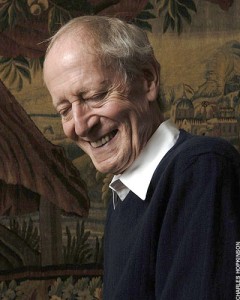Barry’s work for James Bond is probably the go-to for many on the sad occasion of his passing. Regardless of who came up with the title theme, the lush symphonic scores for From Russia With Love, Goldfinger, On Her Majesty’s Secret Service, and especially the underwater passages of Thunderball are the definitive Bond music. Regardless of who they brought in to tweak or replace Barry, James Bond’s music will always be Barry’s, and he’s had as much of an impact on that series (I hate to use the word “franchise”, its crass connotations have no place in recognizing a genius) as any other collaborator. Put simply, he’s defined the sound and cool, and amped up the best set pieces with an impeccable sense of strum und drang.
But at this moment of Bond nostalgia, I would love to celebrate his work in The Living Daylights – a film that many Bond fans consider one of the best of the franchise though is considered underrated – which melded a contemporary sense of Bond with the old school to which Bond still belonged. It was a relaunch in a way that is defined by its 1980’s origins, but Barry’s score helped turn the film into a classic adventure for the character. As bored as Roger Moore and company might have been during such flights of obligation as A View to a Kill, Barry’s work made those films – if not worthwhile – than not entirely negligible.
If I were to make a case for John Barry full-stop, it wouldn’t be his excellent work for such diverse films as Zulu, Petulia, The Ipcress File, or The Last Valley, but his scores for such obvious misfires as the 1976 remake of King Kong and The Black Hole. Like Ennio Morricone’s work on Orca or Mission to Mars, the art he created by scoring those films turned efforts that are either interesting but underwhelming films or complete botches into works of art that can be defended because of his soundtracks. I don’t know how the remake of King Kong would play without Barry’s score, and I don’t want to imagine it either. Regardless, I can defend the 76 King Kong as better than Peter Jackson’s version if only because of Barry’s score. I remember being at a Beta Band show, and the fact that they used a sample from Black Hole made me like the band more than their music ever did.
 Barry
started as a musician, and formed the John Barry Seven, which scored
popular British television at the time, until his skills lent him to
Bond. From there his work was mostly celebrated, as he accrued five
Oscars for works as diverse as Dances With Wolves, Out of Africa (actually not that disimilar) and The Lion in the Winter. He worked a lot on English films, but was courted by Hollywood some, and he turned out great pieces for such films as The Deep, Inside Moves, and Body Heat. Again, he made films like Mercury Rising and Chaplin all the better for his efforts.
Barry
started as a musician, and formed the John Barry Seven, which scored
popular British television at the time, until his skills lent him to
Bond. From there his work was mostly celebrated, as he accrued five
Oscars for works as diverse as Dances With Wolves, Out of Africa (actually not that disimilar) and The Lion in the Winter. He worked a lot on English films, but was courted by Hollywood some, and he turned out great pieces for such films as The Deep, Inside Moves, and Body Heat. Again, he made films like Mercury Rising and Chaplin all the better for his efforts.Barry hadn’t composed a score since 2001’s Enigma, and (like all prolific artists) he had his hands in a number of films that don’t deserve visiting – much less re-visiting – upon his passing, but the man deserves to be placed on a pedestal along such greats as Bernard Hermann, Jerry Goldsmith, Elmer Bernstein, John Williams, and whichever great composer deserves recognizing as a true master of the field. Barry was a master. A maestro. A genius. And there may be no real tragedy in an old man dying,but the sense of loss when a great artist leaves us is inescapable.
